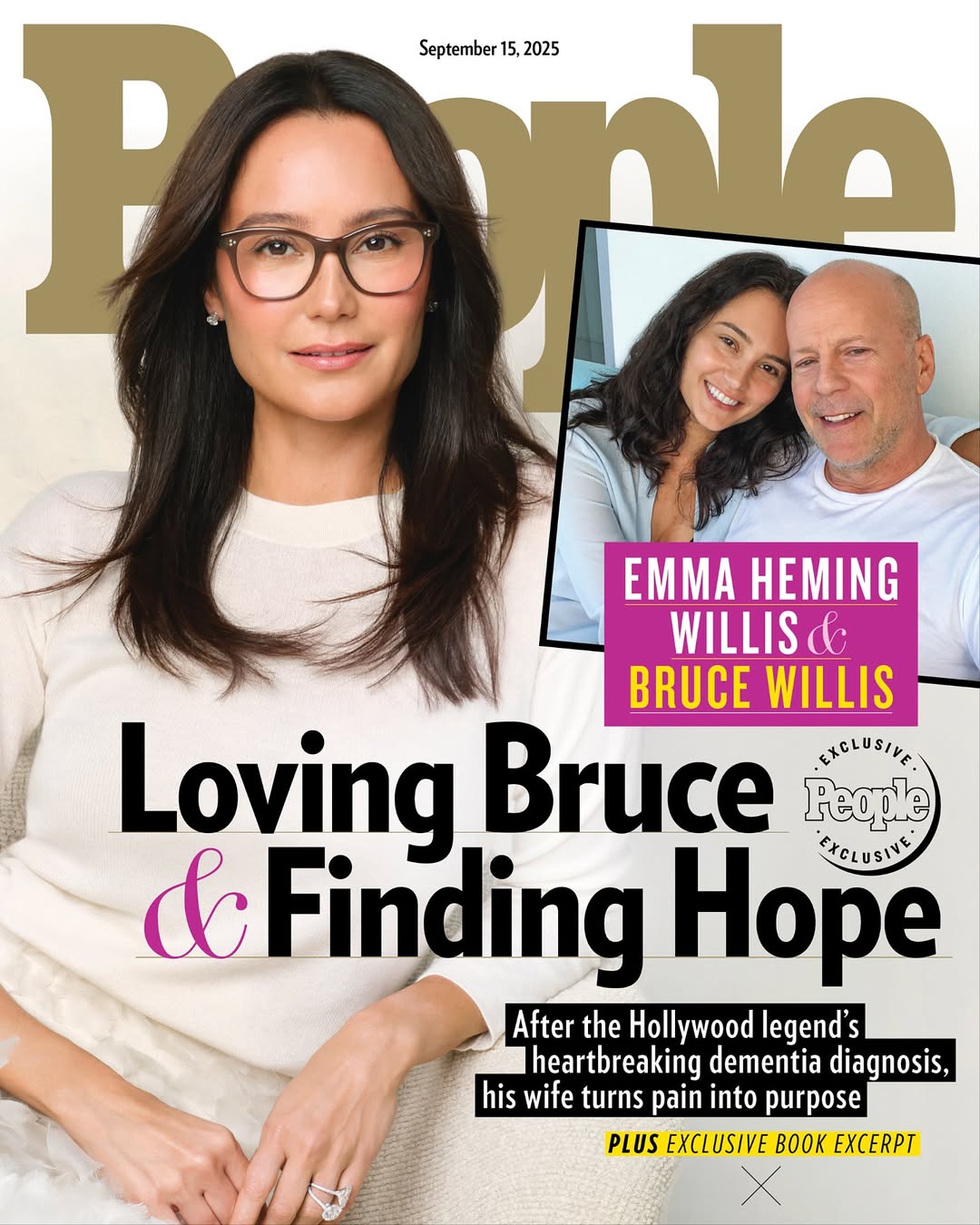
Bruce Willis was diagnosed with frontotemporal dementia in 2022. Since then, Bruce’s family has rallied around him, occasionally sharing family pictures and updates about his condition. Bruce and his wife, Emma Heming Willis, have been together for almost 20 years. They have two daughters, Mabel, 13, and Evelyn, 11. Emma has a new book coming out on September 9, titled, The Unexpected Journey: Finding Strength, Hope, and Yourself on the Caregiving Path. She’s on the cover of People this week, where she talks more about his condition, her feelings of isolation, and their love story.
It didn’t take long for Emma Heming Willis to sense there was something singular about Bruce Willis. Introduced to him by her trainer in 2005, Emma — a flourishing model at the time — remembers Bruce as “so charming, so funny, so down-to-earth and so handsome.”
But stars didn’t align until 2007, when a friend cajoled her into accepting Bruce’s invitation to Turks and Caicos, where he was vacationing with his daughters Rumer, Scout and Tallulah, his ex-wife Demi Moore and her then-husband Ashton Kutcher. “I got to see this other side of Bruce, who was a family man,” Emma tells PEOPLE in this week’s cover story. “On that trip, I ended up falling for him really hard. That was the start of our love story.”
Their romance unfolded with ease: They married in 2009, welcomed daughters Mabel and Evelyn, traveled together to Bruce’s movie sets and built a lively home filled with laughter. “Life was busy… full and fun,” she says. “If the girls were swimming in the pool, he would come home, dive in with his clothes on just to get a laugh. He’s the iconic girl dad.”
But when Bruce was diagnosed with frontotemporal dementia (FTD) in 2022 at age 67, their lives—and dreams for the future—were upended. “Early on, life felt very dark, very one-note of just grief and sadness,” says Emma. As a full-time caregiver, she felt unmoored, isolated and unprepared to navigate Bruce’s progressive illness on her own, much less protect his privacy and parent their two young kids alone.
Emma eventually found a way forward for herself and her family. She sought extensive guidance from experts, found strength in community as one of nearly 12 million people in the U.S. caring for a loved one with dementia, and discovered renewed purpose in caregiver advocacy.
She also discovered a whole new level of connection with Bruce. “I feel like our love story has only grown and developed more,” she says. “It sounds woo-woo but it’s just on a more cellular level. I am so grateful that he is very much here, very much a part of our day-to-day.”
While it’s meant a reimagined dynamic, she sees newfound beauty in their enduring love story. “It has meant so much to be able to meet him where he’s at, to enjoy this time with him,” says Emma, whose new book, The Unexpected Journey: Finding Strength, Hope, and Yourself on the Caregiving Path is a roadmap for caregivers navigating neurodegenerative disease and shines a light on the realities of FTD.
“Bruce is very present in his body, and there is something so lovely and wonderful about that. He’s not thinking about what happened yesterday or what’s happening in the future. He is very grounded in today.”
And although FTD has compromised his speech, Emma cherishes their forever bond forged 18 years ago. “Sometimes, love does not need words. I can just sit there with Bruce, and we look at each other and we laugh and smile and that, to me, is more than anything.”
“Sometimes, love does not need words. I can just sit there with Bruce, and we look at each other and we laugh and smile and that, to me, is more than anything.” Oh, that is just a gut punch. I really like that she has approached it as a “reimagined dynamic” and that their love has grown and developed more. It may not be the love story that they imagined, but it’s still a part of their journey. Emma also revealed that Bruce is no longer living with her and their daughters, but is staying at another home nearby that gives him the “calm and serene atmosphere” that he needs right now.
At one point in the interview, Emma touches upon how FTD is frequently misdiagnosed because it’s not on many doctors’ radar. (Don’t forget that Bruce was originally diagnosed with aphasia.) I hate the circumstances around it, but it’s great that she is raising awareness for something that is notoriously difficult to diagnose, and I truly hope that it makes a difference. And while I obviously do not know much about Bruce IRL, I do think it speaks volumes about him that his ex-wife, current wife, and all of his children get along so well, and that they are all so in sync with how to present their public front. That is a family who protects the people they love.